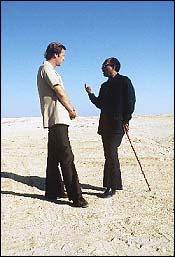
By coincidence, news of Peter Jennings’s death reached me in Beirut, a city he made his own when he opened ABC News’ bureau there in 1968, and through years of reporting on the Middle East that was some of the best of its time, or any other. A memory came drifting through the years, of an evening in the late seventies at Beirut’s old Commodore Hotel, then the watering hole of choice for reporters covering Lebanon’s civil war. It was after filing time and Peter had just bought a round when a younger correspondent approached the table with a sheepish smile. He wanted to thank him, and to apologize for not having the resources to reciprocate. Peter told him that he was more than welcome, and then added, in a lower voice, “If you like, I could buy another round and—if you don’t tell anyone—we could say that it was from you.”
That was vintage Peter: savvy, generous, eager to help and to do so without taking the credit.
Or to take another, more recent example of Peter’s grace, one to which this writer feels a substantial debt: a discussion panel in which the participants were Peter, Tom Brokaw, and myself. The moderator’s questions had turned to a topic I was not at liberty to discuss. Answers came to mind but could not be voiced, a frustrating situation, to say the least. Peter, with no need to touch the subject with a ten-foot pole, spoke up in my defense, offering some of the answers I would have liked to have given but could not. Through the years, whenever I got into something controversial—from just plain bad press to times when I made an outright dumb-ass mistake (there have been so many)—Peter was among the first to call.
This same generosity, coupled with a surmounting curiosity about the world, could be seen in abundance in Peter’s reporting—particularly in his determined efforts to bring knowledge of the Middle East to an American audience. It was a beat he covered with relish, with a knowledge base and contacts that were the envy of other journalists.
In the news, competition is not a zero-sum game—we all benefited from Peter’s drive. It prodded many of us to improve our reporting on the Middle East, its conflicts and their root causes. When its ferment reached our shores on 9/11, we heard the widespread lament that we did not better understand this region—and saw a scramble to rectify this. But how much more impoverished our understanding would have been, how much shakier its foundation, without the focus Peter brought to bear in Beirut and at the anchor desk.
Peter’s urge to look beyond our borders, to survey the far horizon, was both prescient and wise. And his was a necessary voice of conscience amid an industrywide impulse to cut back on international news. Now it is up to all of us in the journalistic craft to preserve one of the most important parts of his legacy: a commitment to open American eyes to the world, to keep them open, and to share what we have seen.New voices will come along—something Peter and Tom Brokaw and this reporter never doubted, despite all the “last of the network anchors” talk that we all thought to be overblown—but Peter’s is one that is not likely to be replaced.